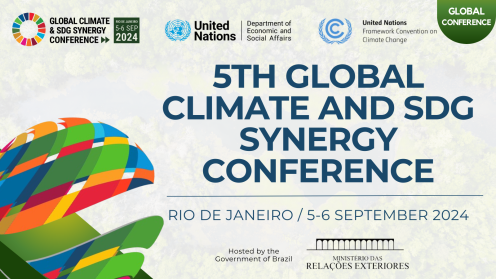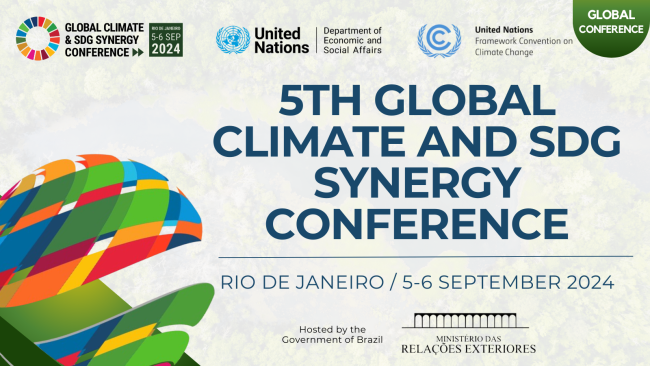About
Speakers noted that evidence indicates pursuing the goals of the Paris Agreement in conjunction with the SDGs will lead to greater co-benefits than trade-offs, while unlocking barriers to synergistic solutions should be a primary focus.
Final report
Summary report 5–6 September 2024
All coverage
The adoption in 2015 of both the 2030 Agenda for Sustainable Development and the Paris Agreement on climate change established a foundation for coherent implementation of climate action and sustainable development objectives across all levels and sectors. The multiple interlinkages between the 2030 Agenda and the Paris Agreement suggest that integrated and synergistic implementation of both would lead to many benefits.
Bearing this in mind, the UN Department of Economic and Social Affairs (UN DESA) and the UN Framework Convention on Climate Change (UNFCCC) Secretariat jointly organized a global conference on strengthening synergies between the 2030 Agenda and the Paris Agreement from 1-3 April 2019, in Copenhagen, Denmark. The Conference sought to identify specific examples to illustrate the potential of synergistic and interlinked approaches, as well as analyze gaps and challenges. It also aimed to offer recommendations for strengthening synergies, increasing ambition, advancing implementation action, maximizing co-benefits, stimulating multistakeholder partnerships, ensuring effective use of resources, and avoiding duplication.
UN DESA and the UNFCCC decided to make the conference an annual event, but the COVID-19 pandemic interrupted plans to hold a second conference in person in 2020. Instead, UN DESA and UNFCCC, with the cooperation of the UN Institute for Training and Research (UNITAR), co-convened three webinars and launched an e-learning course on the theme of “Harnessing Climate and SDGs Synergies.” The webinars and course outlined options for synergistic policy interventions in different sectors using an integrated nexus approach.
The fourth such global conference convened as a special event of the 2023 session of the High-level Political Forum on Sustainable Development (HLPF) and prior to the SDG Summit and the 28th meeting of the Conference of the Parties to the UNFCCC (COP 28). It further sought to feed into these processes with an assessment of progress made against recommendations from the previous conferences, including the need to include principles of just transition at the center of integrated planning for the implementation of climate action and the SDGs. Speakers drew on specific examples for how integrative planning could be achieved linking national biodiversity actions plans, national reporting under the Paris Agreement, and the HLPF process. This was underscored by targeted discussions on finance and partnerships as a conduit to implement some of the targets of climate action.
The 2024 Global Climate and SDG Synergy Conference ran from 5 to 6 September. The conference convened sessions on: building a just and sustainable world; the global state of progress on climate and SDG synergies; bridging the financing divide in addressing the climate challenge; framing the climate challenge through the lens of the SDGs and 2030 Agenda— leaving no one behind; combatting hunger and poverty; and restoration of forests. Speakers included high-level representation from UN bodies, academia, government, and youth representatives. The conference programme was organized to include high-level statements, interactive panel discussions, roundtable discussions, and thematic sessions focused on the climate challenge and its impact on other areas linked to the SDGs.
The ENB writers for this meeting were Nadia Sohier Zaman and María Ovalle. The Digital Editor was Ángeles Estrada. The Editor was Leila Mead.
Funding for ENB coverage of this meeting was provided by the Institute for Global Environmental Strategies (IGES).
To receive free coverage of global environmental events delivered to your inbox, subscribe to the ENB Update newsletter.


